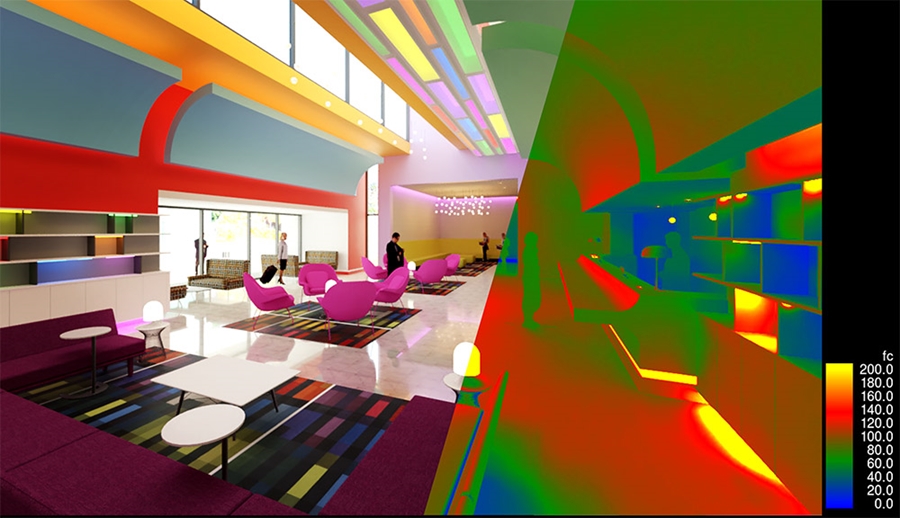
The Nuckolls Fund for Lighting Education has awarded the Department of Interior Design in the Fay Jones School of Architecture and Design a $30,000 grant to develop an upper-level advanced lighting course.
Jake Tucci, an assistant professor of interior design and the principal investigator for this grant, will use the funding to develop the new lighting course and fund it for the first three years.
Tucci and the Interior Design Department are one of just three programs awarded a $30,000 Nuckolls Grant for 2022. The Nuckolls Fund supports college-level lighting programs that enable students to learn, appreciate and apply the fundamentals of lighting design, and to recognize the achievements of the late lighting designer and pioneer lighting educator James L. Nuckolls.
As an expert in visualization and design process, Tucci currently teaches Lighting Systems, an introductory lighting course, and Digital Media in Design, which introduces digital tools and also touches on lighting.
Tucci said that teaching those courses helped reveal the need for the advanced course, which is why he submitted the Nuckolls Grant proposal. Although he's reworked his introductory lighting course, he still doesn't have enough time to delve much into the application of lighting theories. As a result, even upper-level students tend to overlook including in-depth lighting schemes in their studio designs.
"You can do all these wonderful lectures and show all these wonderful examples of design, but when the rubber meets the road in studio, you don't see that exploration; you don't see the influence of all that," he explained.
Lighting design is a fundamental component of interior design. It is invaluable for creating the perception of space and form, and it also affects the well-being of people using the space. Tucci said that although it's important, it tends to be an afterthought in students' design work, since many interior design programs don't have enough time to devote to lighting in the curriculum.
"Students do a design, but they don't know how it's going to turn out, what it's really going to look like," Tucci said. "We're looking more into advancing applications and analytical tools and experimenting and testing."
Tucci said one of the overlooked areas is analyzing and testing lighting schemes, which will be a focus for this advanced course.
"These advanced skills will set our interior design graduates apart from most students in the nation," said Carl Matthews, head of the Department of Interior Design.
Part of the grant funding will go toward hiring a lighting design consultant who will work with Tucci on developing the course curriculum and then help teach the course. Tucci said having a lighting designer play an equal role in developing and teaching the course is a priority in making sure the course is responding to the most current knowledge and industry practices.
The funding will also go toward purchasing light level meters and color spectrometers — tools that will allow students to test light levels and color so they can compare them to official standards. Tucci said they talk about these tools and standards during the introductory lighting course, but don't have time to test them out in class.
The advanced course will be much more focused on hands-on projects and active learning, and students will conduct case studies so they can really learn how to use the lighting tools. They'll also use digital tools to explore lighting schemes in their own studio projects to see how those would actually look.
One digital tool is the ELUMTools lighting analysis software, provided for free to students by LightingAnalysts.com, which offers a fully integrated lighting calculation add-in for Autodesk Revit.
Students in the advanced lighting course will also go on field trips to see examples of well-designed lighting in built projects, lighting manufacturers and construction sites where lights are being installed.
Tucci said he hopes the knowledge and skills that students learn during the advanced lighting course will trickle down to other studios. He plans to consolidate results from the lighting analysis testing conducted in the advanced course to use as lessons in the introductory lighting course. He also hopes that students in the advanced course become more adept at incorporating lighting schemes in their other studios.
"My hope generally is that, eventually, studios start to consider lighting earlier on in the design process — that it becomes a more integrated part of their studio work," Tucci said.
The first advanced lighting design course will be offered as an advanced design studio, an optional course for upper-level design students, during the Spring 2023 semester. The studio will hold 15-20 students and will be open to interior design, architecture, landscape architecture undergraduate students and Master of Design Studies students.
"They're going to bring different backgrounds to it — what they've already learned about lighting, as well as different types of projects," Tucci said.
Tucci said the plan is to continue offering the advanced lighting course beyond the three years included in the grant, so he will design the course in a way that will make it easy for other professors to take over teaching the materials in the future, even if they are not lighting experts.
Topics
Contacts
Shawnya Lee Meyers, digital media specialist
Fay Jones School of Architecture and Design
479-575-4744,
Michelle Parks, director of communications
Fay Jones School of Architecture and Design
479-575-4704,